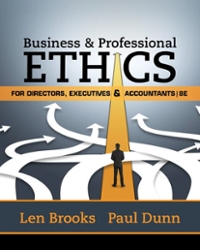It was early on a Friday morning in London7:15 a.m. on February 24, 1995, to be exactthat
Question:
It was early on a Friday morning in London—7:15 a.m. on February 24, 1995, to be exact—that the phone call came for Peter Baring from Peter Norris. Baring’s family had been in banking since 1763.
They enjoyed the patronage of the Queen of England and had financed the Napoleonic Wars and the transcontinental railway in Canada. Barings, London’s oldest merchant bank, would soon be owned by foreign interests because of Norris’s news.
Early on the previous day, Norris, the head of investment banking, had been summoned to Singapore by James Bax, the regional managing director of Baring Securities.
Its star trader, Nick Leeson, had not been seen since Wednesday afternoon Singapore time, and it appeared that he had left major unhedged securities positions that Barings might not be able to cover. If not, Barings would be bankrupt or owned by others who could pay off what was owed when the uncovered commitments came due.
At the beginning, Barings officials were not sure what had happened or the extent of the potential losses and commitments.
When they did discover the nature of their obligations, they realized that the securities contracts were still open so that the upper limit of their losses would not be known until the closing date of the contracts.
If the markets involved sank further by that time, Barings’ losses would grow.
This was a complete shock because Leeson was supposed to deal in fully hedged positions only, making his money on shortterm price changes with virtually no chance of losing a significant amount of money.
What had happened?
Norris found confirmation of what Bax had told him. Essentially, Leeson had built up two huge securities positions. He had arranged futures contracts committing Barings to buy U.S.\($7\) billion worth of Japanese equities and U.S.\($20\) billion or more of interest rate futures at future dates. Unfortunately, due to the Kobe earthquake in Japan, the Japanese stock market was falling, so the equity contracts were worth less than he had paid, and the projected losses were growing but not yet at their maximum. In fact, it was estimated that every 1% decline in the stock market raised the losses by U.S.\($70\) million.
When Peter Baring, the chairman of the bank, advised the Bank of England on Friday at noon that his bank had a potential problem, he estimated the combined losses at £433 million (U.S.\($650\) million), a figure that was close to the shareholders’ equity of
£541 million. The governor of the Bank of England, Eddie George, was recalled from his skiing holiday in France, and his deputy, Rupert Pennant-Rea, called other British bankers to meet at the Bank of England to pledge funds to help meet Barings’ problem.
Prospective purchasers were canvassed throughout Saturday, but the loss estimate rose to £650 million with no cap in sight.
On Sunday, several options were pursued, including contacting the world’s richest man, the Sultan of Brunei. The British bankers met again at the bank at 10 a.m., and by 2 p.m. they had agreed to provide
£600 million. The question of what their return would be for advancing the money was being debated, but the issue of someone providing an upper cap to the losses remained. An offer arrived from the sultan to do so, which included the taking over of Barings. Unfortunately, this offer was withdrawn before a deal was consummated, and Eddie George had to sign an Administration Order that essentially put Barings under the administration of the Bank of England. At 10:10 p.m., the Bank of England announced that Barings had failed.
Two hundred thirty-three years of stewardship by the Barings family was over..........
Questions:-
1. How would you deal with a star trader whowould be extremely sensitive to additional controls that implied he or she was not trusted or would generate more time on paperwork and explanations?
2. What ethical and accounting controls would you advise ING to institute at Barings?
3. Who was more at fault—top management or Nick Leeson?
Step by Step Answer:

Business And Professional Ethics
ISBN: 9781337514460
8th Edition
Authors: Leonard J Brooks, Paul Dunn





